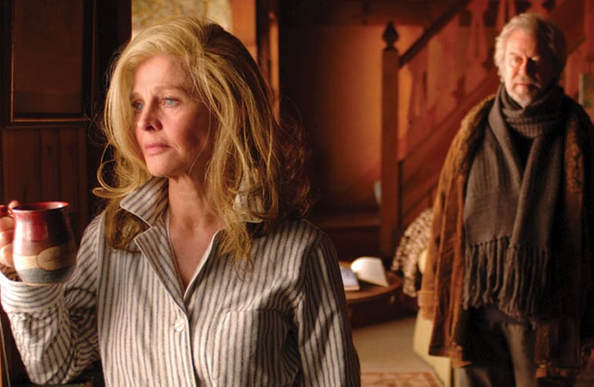If you’d like some first-rate biblical encouragement, take a few minutes to listen to “The Battle Is Not Your Own.” Based on Exodus 17, it's Chris Carrillo’s latest message to the folks at Care-age of Brookfield:
|
Are you warring with the flesh or with the world? Never fear: If you belong to Jesus Christ, you will never be alone. If you’d like some first-rate biblical encouragement, take a few minutes to listen to “The Battle Is Not Your Own.” Based on Exodus 17, it's Chris Carrillo’s latest message to the folks at Care-age of Brookfield: (Reading this via email? Please click on the title above to be taken directly to the message.)
0 Comments
Some time ago, I had the chance to watch the critically acclaimed 2006 movie “Away from Her.” Starring the still-gorgeous Julie Christie, it’s the story of a husband and wife – Grant and Fiona – whose relationship is about to undergo monumental and permanent changes. Fiona, you see, has Alzheimer’s. And the disease has progressed enough that, early on in the movie, she decides it’s time for her to move into a nursing home.
There are no real surprises in this story. Fiona becomes increasingly forgetful, stops recognizing her husband, attaches herself to another resident. Grant is miserable, visits Fiona often, becomes lonely, seeks the advice of a nurse with a heart of gold. She tells him that Fiona may yet have some lucid periods, but that he shouldn’t get his hopes up because they won’t last. And indeed that’s precisely what happens in the end; but because of heart-of-gold’s warning, Grant doesn’t take even a moment’s break from his misery. And there you have it: another beautifully filmed tear-jerker delivering a clear message of hopelessness. Which is pretty much the message most critically acclaimed American movies, novels, and TV shows have been delivering for the last 50+ years. No wonder there’s so much despair in our culture today. But get this: one doesn’t encounter much of this relentless gloom at nursing homes. Sure, there’s day-to-day unhappiness over the kids’ failure to visit or an aide being disrespectful, and certainly those with unrelenting pain or severe disabilities are far from delighted with their current circumstances. But there’s a huge difference: Even through such suffering, many – perhaps most – of today’s nursing home residents are leaning on the everlasting arms of God. They are resting in the certainty that, no matter how bad things get in this life, the best is yet to come. And the older they are, the more certain they are that heaven will be their next stop, their home forevermore. Sadly, this is beginning to change, as people who came of age in the post-war years check in to long-term care. There seems to be less assurance of heaven, less faith in God’s love for them, less confidence that they will ever escape from the downward slide their bodies have taken. Astoundingly, there also seems to be less interest in hearing evidences for happily ever aftering. There are no doubt many reasons for this growing agnosticism among the newly elderly. But I think we can put a lot of the blame on Hollywood, and on our lack of discernment in the face of attractive actors, heart-wrenching story lines and lavish cinematography. The solution? At the very least, we should take the time to analyze the messages that we’re being fed by the entertainment industry – and to reject anything that’s simply emotional, unprovable or an outright lie. Then we should give God equal time to make His case for forever, via the Bible, sound teaching, and fellowship with born-again believers. Because here’s the truth: No one has to end his life like Grant and Fiona did, in hopelessness and despair. For anyone willing to repent and trust in Christ, the best really is yet to come. Because of personnel changes at the nursing home where I volunteer, I’m now leading a long-standing weekly Bible Discussion. What a challenge it is, given the widely varying branches of Christianity represented each week, not to mention an interesting cross-section of unbelievers. The common denominator seems to be that most of them have never studied the Bible and are unfamiliar with even its most important teachings.
That’s why a recurrent message in our sessions is the gospel, and what the Bible says about eternal life—quite a surprise for many of these lovely people. But why should anyone believe what the Bible has to say about everlasting life, when there are so many versions of it being taught today? As one participant reported recently, although he and his contemporaries were raised in “the church,” they were taught that the Bible is nothing more than a collection of myths and fables, and so can be safely ignored. Clearly, it’s critically important to persuade each member of our group that the Bible is divinely inspired and inerrant--and that we can therefore trust what it says about everlasting life. Just one question: How? I’ve given my testimony, but it rests largely on the scientific, historical and prophetic evidence that led me to the Lord. Perhaps it’s not surprising that this audience is less than captivated by what I have to say on these subjects. Irreducible complexity? The fallacious assumptions of radiometric dating? The prophetic fulfillments in Israel’s 1948 restoration? I guess these topics can be enough to make even youngsters nod off, given my less-than-thrilling leadership style. But there are many other approaches that can be taken. For instance, to demonstrate how the Bible came into being and was preserved over the centuries—a history which in itself confirms its divine origins—we’ve been reading from books like the late Ken Connolly’s fabulous The Indestructible Book. And for an overview of some hard-hitting facts about God’s word, we’ll soon check out highlights from my dog-eared copy of Josh McDowell’s The New Evidence that Demands a Verdict. At the same time, we’ve been exploring specific issues of interest to these folks, such as suffering: How does the Bible explain it? I can’t think of an issue that doesn’t confirm the Lord's inspiration of the text, once it’s viewed through the lens of the Bible. But the clock is ticking away and God only knows how much time each of us has left. So if you, dear reader, have any suggestions for me on quickly proving the Bible’s cover-to-cover truth, I’d love to hear from you. To reply, please click on the green “Comments” at the end of this post, or contact me via this page, or email me at [email protected]. Many thanks! Last summer, I wrote about a terrific 70-something man who was recuperating at the nursing home where I hang out -- about what a wonderful impact he had on the other residents because of the way he engaged them in conversation, no matter how disabled or befuddled they were. This man -- let's call him Elmer -- never failed to ask them about their health and their families and their interests. He talked to all his fellow residents as human beings of intelligence and worth.
And the frosting on the cake: Elmer teased many of them. He did it gently, kindly, and always playfully, and he seemed to know exactly who would enjoy it. As a result, there seemed to be lots of grins and giggles whenever he was part of a circle of wheelchairs. Alas, Elmer has left the building. I hope he'll be back as a volunteer one day, but I won't hold my breath; he's probably too busy facilitating friendships in the assisted living facility he now calls home. With people like him, there's never enough time to go around. But I'm happy to report that I witnessed another smile-maker at work not long ago. I'll call this fellow Nate. Nate is an interesting fellow. He's feisty and occasionally cantankerous. He's also kind, smart, well-informed, and very knowledgeable about the Bible -- always a plus in my book. Nate has a roommate I'll call Samuel, a super-sweet older fellow who always seems a little sad, and occasionally a little bewildered. I've known him at least a couple years, and have never seen him even crack a smile. Before Christmas, when I stopped to visit them, I saw that Samuel's family had put a sizable Christmas tree on his dresser, with beautiful ornaments. When I complimented him on it, he said, very sadly, that he had tried to light it but it didn't seem to work. "Dumbkopf!" Nate cried, struggling to his feet and making his way over to the tree. "Just flip this switch. Do I have to do everything for you?" Shocked, I looked at Samuel again, expecting to see anger on his face, or more likely a display of hurt feelings. But not so. Instead, Samuel was grinning. He was beaming. He laughed out loud as Nate lit the tree. Apparently, this not-so-gentle teasing was just what Samuel needed. Maybe it made him feel like one of the guys. Maybe it made him feel loved. Apparently it was an improvement over the careful expressions of concern and sympathy we women tend to deliver to people who seem a little forlorn. For at least some people, teasing seems to be a wonderful way to warm their hearts and tickle their funny bones. I think Elmer and Nate are really on to something. For details, visit Sadie Sparrow's personal web page. Then pick up your copy from Amazon or Barnes & Noble.
|
Kitty
|





 RSS Feed
RSS Feed